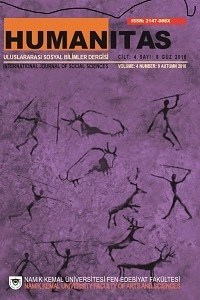ÜBER DIE HISTORISIERUNG IN ANNA SEGHERS’ DAS SIEBTE KREUZ
ON HISTORICIZATION IN ANNA SEGHERS’ DAS SIEBTE KREUZ
Author(s): Burcu ÖztürkSubject(s): Military history, Political history, German Literature, Theory of Literature
Published by: Namık Kemal Üniversitesi Fen-Edebiyat Fakültesi
Keywords: Anna Seghers; Historicization; National Socialism; Reality; Fiction; Symbolic;
Summary/Abstract: Anna Seghers’ novel The Seventh Cross (1942) depicts the society of the Third German Empire. Anna Seghers, who has undeniable importance for the Exile literature, combines real and fictional symbols to describe national socialism in Germany in The Seventh Cross. In fact, in her novel The Seventh Cross Anna Seghers describes the cultural and historical process of humanity. In this way, something comes in the text, that can be referred to as a Historicization. In the novel, history seems like a power process, and there are the winners and losers in this process. Or in another words, it can be said that the winner will lose one day. Thanks to the different examples of the phenomenon of historicization, such as the use of symbolic numbers and symbolic use of the cross, the problem that Anna Seghers describes is of a universal dimension. The aim of this work is to explain this phenomenon in detail. Therefore the relationship between fictionality and factuality in The Seventh Cross should be first clarified and then the symbolism of the novel is explained. The third step is to analyze the historicization in the text.
Journal: Humanitas - Uluslararası Sosyal Bilimler Dergisi
- Issue Year: 6/2018
- Issue No: 11
- Page Range: 239-255
- Page Count: 17
- Language: German

